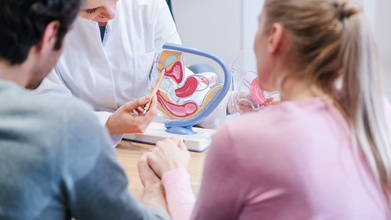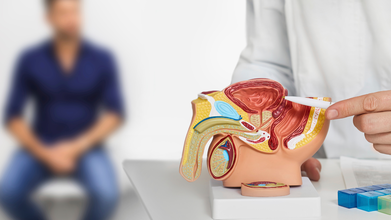- Health Conditions A-Z
- Health & Wellness
- Nutrition
- Fitness
- Health News
- Ayurveda
- Videos
- Medicine A-Z
- Parenting
- Web Stories
Delhi Pollution: When Is It Safe To Be Out?

Polluted air is the single largest, invisible environmental risk that is hazardous to human health. As per the State of Global Air 2020 report, it resulted in 6 million deaths globally, out of which 1.6 million deaths were in India alone.
Dr Vivek Nangia, a Gurugram-based pulmonologist and a member of DocTube explains that while these deaths occurred due to stroke, heart attack, lung diseases, and neonatal diseases, they all were attributable to poor air quality. The number has increased by 115.3% from 1990. These deaths are three times more than the deaths that are caused by HIV, tuberculosis and malaria put together and 25 times more than all deaths from wars and all forms of violence, he notes.
Another study notes that air pollution resulted in the reduction of average life expectancy of individuals by 5.3 years and in Delhi, it is reduced by 11.9 years.
Delhi AQI today stands at 500 in the "severe" category. Three days ago, Lahore recorded an AQI of 1900, it still remains beyond 1000. Pakistan is blaming the easterly winds from Amritsar and Chandigarh for spiking Lahore's AQI. "The wind from India towards Lahore…is taking the smog to dangerous levels and the wind is likely to sustain its direction for at least next week… People should take care of themselves by avoiding unnecessarily coming out of their houses. The elderly and children should be particularly careful…," said Maryam Nawaz.
Is There A Right Time To Be Out?
"Pollution levels tend to be slightly lower in the afternoon," says Dr Nangia. In India's five biggest cities, PM2.5 air pollution is highest in the morning and lowest in the afternoon. As per a 2023 study by an air filter brand, Delhi's air pollution peaked at 9AM and gradually improved as the day progressed. On an average, Delhi sees roughly as half as much PM2.5 by 5PM. Similarly, in Kolkata, the pollution peaks at 8am and is lowered by 4PM. In Mumbai, the peak comes at 9am and is improved by 4pm. In the case of Chennai and Hyderabad, the peak comes at 8am with Pm2.5 at the lowest at 3pm or by noon. "However, it is vital to wear well-fitted masks," the doctor suggests.
Is It Safe At Night?
Noon is when the sun is at its peak, it heats the ground and causes warm air to rise and mix with the atmosphere. This helps to disperse pollutants. However, at night, the ground cools down and leads to a temperature inversion. This means that air neat ground becomes colder than the air above it, trapping pollutants close to the surface.
What Can You Do To Protect Your Health?
Dr Nangia provides a list of Do's and Dont's to protect yourself against air pollution and smog:
- Stay indoors or at least restrict their outdoor movements to only bare essential activities
- Totally avoid strenuous physical work/exercise outdoors
- Avoid going for morning walks until it's bright and sunny outside.
- Avoid travelling during peak hours
- Wear a mask when going out. N95 or N99 masks provide protection from 95% and 99% of PM 2.5 particles respectively. Although they do not provide protection against the toxic gases.
- If you are suffering from Asthma or COPD, then visit your doctor to understand drugs to be used in an emergency.
- Quit smoking
- Keep your environment clean
- Don't let car engine idle and avoid open-air burning.
- Keep windows of your cars rolled up
- Car pooling is an option
- Use Public transport (Underground Metros)
- Don't use pesticides and other chemicals on your lawn and garden.
- Support laws that aim to improve air quality.
- Avoid fossil burning
- Keep indoors clean
- Air Purifying plants such as palm, ficus, Aloe Vera, Ivy and Spider Plant can be placed in the home and offices.
- Ensure there is a chimney in the kitchen and an exhaust in the bathroom to throw out the toxic air
- Avoid incense sticks, lighting candle and diyas inside the houses.
- Consume Fruits rich in Vitamin C, Magnesium , Foods rich in Omega Fatty
3 Fertility Truths Every Woman Should Know, According To A Gynecologists

(Credit-Canva)
Infertility impacts millions across the globe, touching both men and women alike. According to the World Health Organization, around 17.5% of the global population, roughly one in six people, experience fertility challenges. This condition can significantly reduce or even prevent natural conception.
Yet, despite its prevalence, infertility remains clouded by myths and misconceptions, many of which unfairly place the blame solely on women. Seeking to debunk these long-held beliefs, Dr. Holly Miller, an American Board-certified obstetrician and gynecologist, took to Instagram to share three important truths every woman should know about fertility.
3 Truths About Fertility Women Should Know
With the help of modern medicine and medical interventions like IVF, fertility treatment can help people boost their chances of reproducing.
Infertility Isn't Just a Woman's Issue
It’s important to understand that infertility affects both partners — it’s not solely a woman’s issue. Blaming only the woman is both unfair and inaccurate. In fact, experts find that the causes of infertility are almost evenly split between men and women.
Roughly one-third of infertility cases are linked to the woman, another third to the man, and the remaining third result from issues affecting both partners — or from causes that doctors are unable to clearly identify.
To identify the cause of infertility, both partners should undergo testing simultaneously. For men, a semen analysis — a quick and straightforward test — is often the easiest and most informative first step.
The "Wait One Year" Rule Changes with Age
Most couples automatically try to conceive for a full 12 months before they think about seeing a fertility doctor. However, the doctor emphasizes that the woman's age is the single most important factor that affects the chances of successful treatment.
If you are under 35 years old: You can safely try for a full 12 months of regular, unprotected sex before seeking a specialist.
If you are 35 or older: You should contact a specialist after only 6 months of trying without success.
If you are 40 or older: You need to see a specialist right away—as quickly as you possibly can.
The doctor explains that after age 35, the woman's egg supply starts to decline more quickly. Time is essential, so couples should strongly ask their doctors for an early referral.
"Unexplained Infertility" Often Means "Undiagnosed Problem"
When a couple is diagnosed with "unexplained infertility," which happens in about 10% to 20% of cases, it means the basic first tests did not find a clear reason. This can be upsetting, but it does not mean you can never have children. In the doctor's experience, the term "unexplained" often means there are hidden problems, such as:
- Small issues with the male partner's sperm that were missed by the basic tests.
- A hidden condition called Endometriosis, which can only be confirmed by a surgical procedure.
- Not having sexual intercourse at the best time or not often enough.
Hyderabad Neurologist Shares Case Of 25-Year-Old Software Engineer Diagnosed With ‘Tennis Elbow’ Caused by Computer Overuse

(Credit-Canva)
In today's corporate world, desk jobs have become the order of the day and so are the health problems associated with them. Endless typing, long hours of sitting, and poor posture are silently taking their toll on young professionals who spend most of their day glued to screens. Many don't realize that their daily work habits could trigger unexpected medical conditions.
Such a growing concern was once highlighted by Hyderabad-based neurologist Dr Sudhir Kumar, who recently shared a case on X. He wrote about one such case of Riya (name changed), a 25-year-old software engineer who developed a sharp, burning pain in her elbow-a pain which began as a minor ache while typing and gradually became so severe that even lifting a teacup felt unbearable.
What was the cause of the sharp elbow pain that Riya experienced?
Riya tried everything she could think of: Rest, pain relief balms, painkillers, even switching hands while using her computer, but the pain refused to fade. When she finally decided to visit the doctor, her symptoms immediately pointed to something unexpected: Tennis elbow. The diagnosis came as a surprise, considering she had never even held a tennis racket. On examination, Dr Sudhir Kumar found the tell-tale signs of the condition, medically known as lateral epicondylitis — tenderness along the outer elbow and pain when she tried to extend her wrist. He explained that the culprit wasn’t a sport, but repetitive strain from long hours at the computer — a problem increasingly common among desk workers.
What is Tennis Elbow?
The Mayo Clinic describes tennis elbow, medically termed lateral epicondylitis, as a painful condition resulting from the overuse of muscles and tendons in the forearm. It develops where these tissues are repeatedly strained by similar wrist and arm movements, leading to tiny tears and inflammation near the elbow.
The name is misleading, and you don't have to be an athlete to get tennis elbow. As a matter of fact, most people who develop it never have used a racket. It's common for the condition to strike people in jobs that require repetitive motions: plumbers, carpenters, painters, butchers, and yes, office workers who spend hours typing or using a mouse.
The pain generally arises on the outside of the elbow, precisely at that bony prominence to which the muscles of the forearm attach. For some, the discomfort may extend into the forearm or even the wrist, making most activities quite arduous.
How Can Tennis Elbow Be Treated?
Once the diagnosis was confirmed, Dr Sudhir Kumar focused on addressing the underlying cause — repetitive stress and poor workstation ergonomics. The holistic treatment for Riya included the following:
- Avoided repetitive activities that triggered her pain.
- Adjusting the computer setup and improving posture.
- Establish a physiotherapy regimen to stretch, strengthen, and gradually build muscle endurance.
- A short course of anti-inflammatory medication
Employing a counterforce brace-a tennis elbow strap-to reduce strain in daily activities. By her six-week follow-up, Riya’s pain had completely resolved. Her grip strength was back, and she could type, lift, and exercise without discomfort. Three months later, she was symptom-free — and far more aware of how small ergonomic changes can make a big difference.
80% Americans Do Not Know THIS Key Fact About Early Prostate Cancer Symptoms

(Credit-Canva)
Prostate cancer is one of the leading causes of cancer deaths, however, a recent survey showed that most people don’t know this vital fact about prostate cancer symptoms.
Prostate cancer is a serious illness in the US, affecting over 300,000 men each year and causing more than 35,000 deaths, according American Cancer Society. This makes it the second-most deadly cancer for men. If doctors detect the disease early, it is treatable. However, patients usually don't notice any signs of the disease in its beginning stages. Due to this lack of symptoms, checking for the disease is extremely important.
A recent survey of 1,004 U.S. adults, commissioned by the Ohio State University Comprehensive Cancer Center, aimed to gauge public knowledge of the disease. The findings highlight a critical need for better education.
What Do Americans Know About Early-Stage Prostate Cancer?
The results showed that most people, 80% of those surveyed, are unaware that early prostate cancer usually has no physical symptoms. One health specialist noted that it's crucial for everyone to understand that this cancer causes no symptoms until it has become advanced. The survey also revealed other gaps in knowledge:
- More than half of the people surveyed (59%) did not know that changes in sexual function could be a sign of prostate cancer.
- The survey noticed some differences across groups. For example, one minority group was better at identifying less common signs like tiredness and weight loss.
- However, that same minority group was less likely than others to correctly identify that the cancer usually has no symptoms in its early stage.
What Is The Best Way To Diagnose Prostate Cancer?
The fact that prostate cancer often begins without symptoms is the main reason doctors worry.
Lack of Symptoms
In its early phase, the cancer is small and contained within the prostate gland. It doesn't push on or block any other body parts, so it doesn't cause pain or discomfort. Because the cancer is deep inside the body, it's hard to tell if someone has it without special tests.
Provider Worry
Because men feel fine, they may wrongly believe they aren't at risk. This feeling of being safe often makes men hesitant to get screened. Since there are no symptoms to look for, screening tests, usually a simple blood test or a physical exam, are the best way to find the cancer early.
What Are Some Signs of Prostate Cancer?
Even though most men with early prostate cancer feel completely normal, there are certain signs that might appear if the disease is more advanced. These symptoms include:
- Having trouble starting to urinate.
- Having a urine flow that is weak or stops and starts.
- Needing to urinate often, especially during the night.
- Difficulty completely emptying the bladder.
- Feeling pain or a burning sensation while urinating.
- Noticing blood in the urine or semen.
- Feeling pain in the back, hips, or pelvis that doesn't go away.
- Experiencing pain during ejaculation.
When Should You Get Screened For Prostate Cancer?
According to American Cancer Society, health organizations advise men to talk with their doctors about getting checked for prostate cancer starting at certain ages, depending on their personal risk.
Average Risk: Age 50
Men who have no special risk factors.
High Risk: Age 45
Men who are African American or who have a father or brother who was diagnosed before age 65.
Highest Risk: Age 40
Men who have more than one close relative (father or brother) diagnosed at an early age. There is no one-size-fits-all advice for screening. Men should always speak to their doctor about their own risk and discuss the pros and cons of testing. Since there are no early warning signs, talking to a doctor about screening is described as "critical" and a simple process that could potentially save a man's life.
© 2024 Bennett, Coleman & Company Limited

